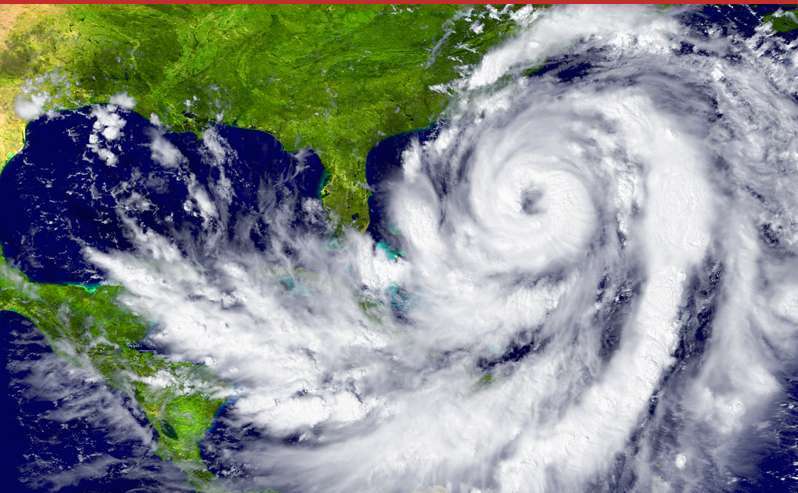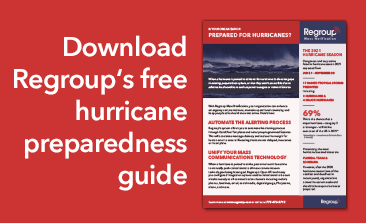
Keep Your Employees Safe During Hurricane Season with Regroup’s Preparedness Checklist
The 2020 Atlantic hurricane season was the most active and the fifth costliest Atlantic hurricane season on record, according to the National Oceanic and Atmospheric Administration (NOAA). The record-breaking storm season saw a staggering 30 named storms and 12 storms making landfall in the continental United States. 2020 was also the fifth consecutive year with an above-normal Atlantic hurricane season, bringing with it over $51 billion dollars in property and other damages.
According to the Center for Disaster Philanthropy, over 430 deaths were recorded in the US following the Atlantic storm season of 2020, making it one of the deadliest in recent years.
Hurricane Preparedness Week is May 9 – 15. During this time, it’s helpful for all of us to determine our risk, identify our proximity to evacuation zones, review homeowners insurance and prepare a list of items that may be needed during a hurricane. This is also an excellent time for organizations to remind employees and staff of safety considerations and how to proceed if storms should force facility closures.
For those who live in hurricane-prone areas, preparation should begin before June 1, which is considered the start of hurricane season. This means fortifying workspaces and homes for high winds, flash floods and prolonged utility outages. It also means having a plan in place for evacuation, personal safety and continued communication throughout the crisis.
Regroup, an NOAA-recognized Weather-Ready Nation Ambassador, has prepared the following checklist for hurricane preparedness. This basic checklist can help you improve outcomes in the event of a hurricane or other severe weather conditions.
Have an Emergency Plan
Talk to your employees to ensure they have an emergency plan in place when severe weather threatens. This means a list of steps that reinforce the safety of each individual and their entire household, and the next steps to take if and when a hurricane impacts your area. Understand the steps to keep all team members safe and review your emergency plan each year — ahead of hurricane season.
Understand Warnings and Alerts
The National Weather Service (NWS) is the primary provider of severe weather warnings and alerts. Using the free FEMA app, you can receive real-time alerts from NWS. Local news outlets also provide mobile apps for reporting on changing weather conditions as well as other local news. During severe weather, it is important to stay informed of developments and be prepared to respond at a moment’s notice.
Prepare Homes and Buildings Ahead of Time
If a hurricane threatens your area, you will have a finite amount of time to strengthen your home or facility against the storm’s damaging effects. Do not wait until the last minute to board windows, clear branches or stow patio and outdoor furniture. Also, bring in things like attached flagpoles and fasten down awnings. In high winds, such items can become projectiles, threatening others with injury or even death.
Plan and Prepare for Evacuations
It is important to understand in what evacuation zone you are located and familiarize yourself with evacuation routes. These can change from year to year, so it’s important to stay updated through state and county websites. Coastal and low-lying areas are typically the first to be evacuated. When the advisory comes, heed it and make sure your car has plenty of gas and other fluids beforehand.
Take Only the Essentials
Your personal go bag should only contain the essentials you need should you be required to evacuate your home. Medications, sanitary needs, high-protein snacks and fluids are all fundamental supplies and should be ready to go at a moment’s notice. Mobile device chargers, first aid kits and pet supplies are also critical to have in your go bag.
If you are the responsible party for your organization, essential documents should be carried in waterproof cases as should any items that could potentially be damaged by flood waters. Your company should have a closure plan in place that alerts key players when it’s time to remove certain items from the premises.
Considerations for Those with Special Needs
If a member of your team or family lives with a disability or a special medical need, be prepared to address those requirements prior to a hurricane striking or an evacuation order. Be certain quantities of necessary supplies and medications are on hand and protected from water damage. Also, contact your county’s emergency management service to learn more about additional services available to persons with disabilities or ongoing medical needs.
Evacuation During COVID-19
If you are directed to a public hurricane shelter, keep in mind the physical procedures that reduce the spread of coronavirus. These include bringing face masks and hand sanitizer in your go bag. Socially distancing will also be important to mitigate the spread of COVID-19 during your stay at a public shelter.
Never Leave Pets Behind
Family pets should have safe carriers and food supplies ready for evacuation. Never leave a housepet at home when a hurricane threatens your region. For those with livestock, secure animals in protective shelters with enough food and water. If your community farming initiative provides additional shelter and care, get in touch with them ahead of the storm to secure a place for your animals.
Helping Friends and Neighbors
If there are elderly, disabled or other persons in your neighborhood who may need additional assistance, check on them. For people who live alone and have no access to transportation, a simple ride to a public shelter could be a lifesaver. Make sure your neighbors have access to the assistance they need and keep in touch with them during an evacuation.
Life Comes First
Though it may be tempting to ignore evacuation advisories, it’s also important to understand that property can always be replaced. Your life — and the lives of your team and family members — take precedence over all else. That’s why it’s crucial to heed evacuation orders when they are made. The dangers of flash flooding and structural damage cannot be overstated. Always listen for and follow evacuation instructions. This goes for businesses as well as households.
Keeping the Lines of Communication Open
With a mass notification system like Regroup, department heads and managers can quickly send out the alert when facing a facility closure. Regroup’s automated emergency alerts, triggered by NOAA/NWS severe weather reporting system. Coupled with Regroup’s unlimited messaging templates, you can quickly and accurately reach key players, as well as your entire network, when time is crucial.
Regroup also features geo-fencing capabilities, allowing you to alert specific facilities or geographical regions. This is particularly useful for multi-location organizations, dispersed workforces or reaching team members in more remote locations.
Finally, Regroup’s robust cloud-based platform is more reliable than traditional means of communication. It can be used to send emergency notifications and updates even when power is out or cellular towers are overloaded. And, Regroup allows you to send to mobile phones, landlines, text/SMS, email, company intranets and social media accounts.
Keeping the people you care about safe and informed is the very mission behind Regroup Mass Notification. Using these steps and maintaining close communication with team members will help improve outcomes for your organization, your team members and their families.
About this Guide
As a Weather-Ready Nation Ambassador, Regroup Mass Notification recognizes the importance of preparedness in the face of severe weather and — in particular — hurricane season. Having the right tools in place, planning ahead and responding quickly can save lives and reduce the potential damage to property.

Regroup offers a free Hurricane Preparedness Guide to help you learn about the risks and advance preparation for your entire organization.
Our guide can help you through the steps of planning for severe weather before the storm hits, and how to recover after the following dangerous weather events. Download it here.
Ready to see more? You can schedule a no-obligation demo of Regroup’s powerful notification system here. |
Table of Contents
Categories
- Regroup Product Guides
- Disaster Recovery
- Employee Safety
- Routine Communications
- Mass Notification
- Critical Event Management
- Emergency Preparedness
- Corporate
- Insurance
- Business Continuity
- Business
- Education
- Uncategorized
- Nonprofit
- Healthcare
- Hospitality
- Government & Public Services
- Our Clients
- Awards
- COVID-19
- Safety & Preparedness
- Announcements